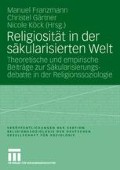Abstract
If, thirty or forty years ago, a social scientist had tried to determine the social position and development prospects of religion and the churches in modern societies, he would probably have relied on the secularization theory. This theory assumes that the modern age and religion are in a strained relationship, and that the more modern a society is, the less socially relevant religion and the churches become. Industrialization, tertiarization — the growth of the service industry — urbanization, increasing prosperity, higher education levels, greater mobility, rationalization, cultural pluralism, individualization — all these factors and whatever other processes are normally viewed as being typical of modernity have, so say the secularists, a negative effect on the continued existence of religion.
Access this chapter
Tax calculation will be finalised at checkout
Purchases are for personal use only
Preview
Unable to display preview. Download preview PDF.
Bibliography
Berger, Peter L. (1973): Zur Dialektik von Religion und Gesellschaft. Elemente einer soziologischen Theorie. Fischer, Frankfurt/M.
Berger, Peter L. (1980): Der Zwang zur Häresie. Religion in der pluralistischen Gesellschaft. Herder, Freiburg.
Bruce, Steve (ed.) (1992): Religion and Modernization: Sociologists and Historians Debate the Secularization Thesis. Oxford University Press, Oxford.
Bruce, Steve (1996): Religion in the Modern World: From Cathedrals to Cults. Oxford University Press, Oxford.
Bruce, Steve (1999): Choice and Religion: A Critique of Rational Choice Theory. Oxford University Press, Oxford.
Campiche, Roland J. (2002): “Does Individualization still Constitute the Paradigm of Religion in Post-Modernity?” Unpublished paper, given at the conference “Europe and the invisible religion.” Zurich January 18–19 2002.
Chaves, Mark / Cann, David E. (1992): “Regulation, Pluralism and Religious Market Structure: Explaining Religion’s Vitality.” Rationality and Society, Vol. 4, 272–290.
Cipriani, Roberto (1989): “Diffused Religion’and New Values in Italy.” in: Beckford, James A. / Luckmann, Thomas (eds.): The Changing Face of Religion. Sage, London. 24–48.
Davie, Grace (1994): Religion in Britain since 1945: Believing without Belonging. Blackwell, Oxford.
Gabriel, Karl (1992): Christentum zwischen Tradition und Postmoderne. Herder, Freiburg/Basel/Wien.
Finke, Roger / Stark, Rodney (1988): “Religious Economies and Sacred Canopies: Religious Mobilization in American Cities.” American Sociological Review, Vol. 53. 41–49.
Finke, Roger / Stark, Rodney (1992): The Churching of America 1576–1990: Winners and Losers in our Religious Economy. Rutgers University Press, New Brunswick, NJ.
Hervieu-Léger, Danièle (1990): “Religion and Modernity in the French Context: For a New Approach to Secularization.” Sociological Analysis, Vol. 51. 15–25.
Iannaccone, Laurence R. (1991): “The Consequences of Religious Market Structure: Adam Smith and the Economics of Religion.” Rationality and Society, Vol. 3. 156–177.
Krüggeler, Michael (1993): „Inseln der Seligen: Religiöse Orientierungen in der Schweiz.“ in: Dubach, Alfred / Campiche, Roland (eds.): Jede(r) ein Sonderfall? Religion in der Schweiz. NZN Buchverlag, Zürich/Basel. 93–132.
Krüggeler, Michael / Voll, Peter (1993): „Strukturelle Individualisierung — ein Leitfaden durchs Labyrinth der Empirie.“ in: Dubach, Alfred / Campiche, Roland (eds.): Jede(r) ein Sonderfall? Religion in der Schweiz. NZN Buchverlag, Zürich/Basel. 17–49.
Lechner, Frank J. (1997): “The ‘New Paradigm’ in the Sociology of Religion: Comment on Warner.” American Journal of Sociology, Vol. 103. 182–192.
Luckmann, Thomas (1963): Das Problem der Religion in der modemen Gesellschaft: Institution, Person und Weltanschauung. Rombach, Freiburg.
Luckmann, Thomas (1991): Die unsichtbare Religion. Suhrkamp, Frankfurt a.M. (Originally: The Invisible Religion: The Problem of Religion in Modern Society. Macmillan, New York 1967).
Martin, David (1978): A General Theory of Secularization. Harper&Row, New York.
Martin, David (1996): „Europa und Amerika: Säkularisierung oder Vervielfältigung der Christenheit — Zwei Ausnahmen und keine Regel.“ in: Kallschauer, Otto (ed.): Das Europa der Religionen: Ein Kontinent zwischen Säkularisierung und Fundamentalismus. Fischer, Frankfurt a. M. 161–180.
Olson, Daniel V. (1999): “Religious Pluralism and U.S. Church Membership: A Reassessment.” Sociology of Religion, Vol. 60. 149–173.
Pollack, Detlef (1998): „Religiöser Wandel in Mittel-und Osteuropa.“ in: Pollack, Detlef / Borowik, Irena / Jagodzinski, Wolfgang (eds.): Religiöser Wandel in den postkommunistischen Ländern Ost-und Mitteleuropas. Ergon, Würzburg. 9–52.
Pollack, Detlef (2001): “Modifications in the Religious Field of Central and Eastern Europe.” European Societies, Vol. 3. 135–166.
Stark, Rodney / Iannaccone, Laurence R. (1994): “A Supply-Side Reinterpretation of the’ secularization’ of Europe.” Journal for the Scientific Study of Religion, Vol. 33. 230–252.
Tomka, Miklos / Zulehner, Paul M. (1999): Religion in den Reformländem Ost(Mittel) Europas. Schwabenverlag, Wien.
Voas, David / Olson, Daniel V.A. / Crockett, Alasdair (2002): “Religious Pluralism and Participation: Why Previous Research is Wrong.” American Sociological Review, Vol 67. 212–230.
Warner, Stephen R. (1993): “Work in Progress toward a New Paradigm for the Sociological Study of Religion in the United States.” American Journal of Sociology, Vol. 98. 1044–1093.
Zulehner, Paul M. / Denz, Hermann (eds.) (1993): Wie Europa lebt und glaubt: Europäische Wertestudie. Patmos, Düsseldorf.
Editor information
Rights and permissions
Copyright information
© 2006 VS Verlag für Sozialwissenschaften | GWV Fachverlage GmbH, Wiesbaden
About this chapter
Cite this chapter
Pollack, D. (2006). Explaining religious vitality: Theoretical considerations and empirical findings in Western and Eastern Europe. In: Franzmann, M., Gärtner, C., Köck, N. (eds) Religiosität in der säkularisierten Welt. VS Verlag für Sozialwissenschaften. https://doi.org/10.1007/978-3-531-90213-5_4
Download citation
DOI: https://doi.org/10.1007/978-3-531-90213-5_4
Publisher Name: VS Verlag für Sozialwissenschaften
Print ISBN: 978-3-8100-4039-8
Online ISBN: 978-3-531-90213-5
eBook Packages: Humanities, Social Science (German Language)

